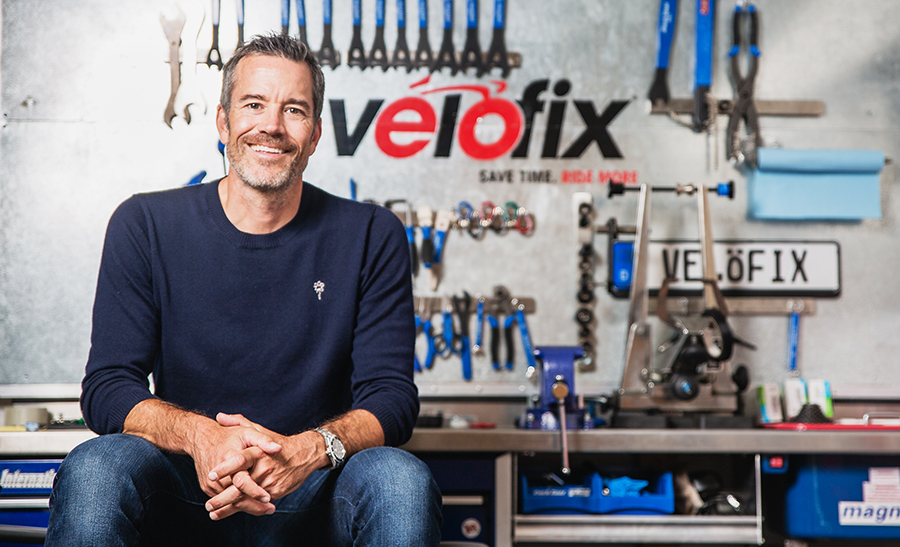By Thomas J. Ryan
<span style="color: #a3a3a3;">Chris Guillemet co-founded Velofix, shown above, with Boris Martin, and Davide Xausa in 2013 on the belief that bicycles could help change the world but hassles getting serviced from traditional brick & mortar bike shops were holding that potential back.
“As consumers, we felt there needed to be a better solution for service and last mile delivery,” said Guillemet, the Vancouver-based company’s CEO.
Velofix has become the largest fleet of mobile bike shops in North America with more than 125 franchise partners in Canada and across the U.S. Described as a “bike shop on four wheels,” the franchisor is known for its 100-square-foot vans that offer nearly everything a traditional bike shop does, including bike repair, bike and parts sales, as well as bike setup and assembly.
Riders book online and a fully-equipped Mercedes Sprinter Van comes right to their office or home to service all their bike needs. In some busy territories, franchise operators have multiple vans, equipped with Wi-Fi, a coffee machine and the promise of friendly advice if you want some do-it-yourself repair tips. Velofix’s motto: “Save Time. Ride More.”
Velofix’s rapid expansion comes amid a strong shift to direct-to-consumer online shopping and as countless bicycle shops have closed or are facing challenging pressures against online sellers.
Now, Velofix is ramping up for its next wave of growth.
Last May, the company raised an undisclosed amount of funding from MacKinnon, Bennett and Co., a Montreal-based clean energy and transportation fund. With that investment, Velofix last October opened a U.S. headquarters in Austin, TX and announced plans to add 30 corporate-owned vans in the U.S. and Canada in the next 12 months. The vans are expected to supplement franchise operations and enable Velofix to offer a nationwide service to brands looking for bike assembly and delivery services.
Here, Guillemet talks about how the Velofix business model developed and how it’s evolving.
What misperceptions about Velofix and mobile bike shops, in general, did the IBD world first have when the concept first arrived? The main misperception was that because we are mobile and do not have the associated overhead of a traditional brick & mortar store that we would compete with lower pricing for labor, parts and accessories. From day one, our business model was to provide a premium experience with the best-in-class product offering. Our model and focus is not to discount and not to compete on price.
What advantages does Velofix offer over the local bike shop? Velofix offers a unique convenience and ultimately saves our customers time. Our Mobile Bike Shops go directly to the customer and provide a premium consistent service where and when the customer wants it done.
What advice would you have for a local bike shop that sees a Velofix arrive in its neighborhood? It does not matter what industry you operate in, you must provide a value add customer experience and be connected to the community. The consumer has many options, so you need to deliver a great reason why they choose your business to spend their hard-earned dollars.
On the vendor side, what apprehensions do some brands still have about working with Velofix? As of today, we do not have any issues purchasing products. We buy from all the major distributors, and we buy direct from many of the key manufacturers in our industry. That definitely was not the case in 2013 when we launched the business.
You work with vendors like Canyon and online marketplaces like Amazon. Do they both work the same way or is one more challenging to execute than the other? We work with many direct-to-consumer bike manufacturers. We have two models that we currently use. One, Velofix delivers and builds the bike for the customer. Two, the manufacturer ships direct to the customer, and Velofix is then scheduled to do the bike build post-delivery. Both of these services allow the customer the peace of mind that their bikes are built by a professional certified mechanic.
On the consumer side, what’s your biggest hurdle in getting consumers to embrace mobile bike shops? Our number one hurdle is simply getting consumer awareness that a service like Velofix exists. We have a net promoter score (NPS) over 96 percent, so we know once the customers try the service they use us again and refer us to their riding friends.
Why did you start rolling out corporate-owned vans? Have you learned anything since the initial rollout? Launching corporate-owned Mobile Bike Shops allows us to scale and build our network faster. The more locations and larger our network of both franchise partners and corporate mobile bike shops, the more awareness we create, the better we purchase and the more valuable we become for bike manufacturers who need us for fleet maintenance and the last mile delivery solution.
How does the new investment from MKB Partners Fund LP help Velofix? Our partnership with MKB has allowed us to build out our senior management team, invest in IT infrastructure, open a new support office in Austin, and roll out corporately-owned mobile bike shops.
What does opening a U.S. headquarters in Austin, TX mean for Velofix? Opening our Austin office allows us to provide a much higher level of support for both our corporate locations and franchise partners in the U.S. market. This office also provides ongoing training for our Rider Support Technicians (mechanics) in the U.S.
Some of your franchisees also tune skis. Is the mobile shop ideally suited for bikes or do you see it extending into other categories? Our current focus is on all types of bikes (road, mtb, triathlon, gravel, commuter, electric), and we do ski tuning and waxing in some locations. Electric bikes is the fastest-growing segment of our business, and we do get many inquiries from electric scooter, electric moto and electric vehicle manufacturers, so there is a massive opportunity there servicing all things electric.
Photo courtesy Velofix
















